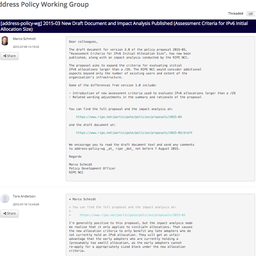It was about one year ago that the RIPE community reached consensus on a policy proposal that introduced additional criteria for initial IPv6 allocations. We thought it was time to look back at the origins of this proposal and see how the change has worked out since.
IPv6 Policies – Fit for Purpose?
The RIPE “ IPv6 Address Allocation and Assignment Policy ” came about as a result of joint discussions between the APNIC, ARIN and RIPE communities back in 2002. At its inception, the policy was one set forth by ISPs for ISPs. And, while there have been some amendments made to the policy over the years, its development has continued to be driven mainly by the needs of ISPs who, until recently, were the main consumers of IP resources.
For example, the criteria for receiving an IPv6 allocation larger than a /29 was previously based on the number of existing users. The intention behind this was to allow large ISPs to provide a sufficient subnet size to their many customers. This meant that, normally, an organisation would need to show plans to provide a /48 to more than half a million customers to justify an allocation of more than a /29.
As the deployment of IPv6 has begun to pick up in many countries, the RIPE NCC has started receiving more and more requests for large IPv6 allocations. These requests have increasingly come not just from ISPs, but also from governmental institutions and multinational companies who want to deploy IPv6 on their large networks. These requests are typically accompanied by detailed addressing plans, including aggregation goals and expansion for multiple networks in a complex, multi-level network structure, which require larger IPv6 allocations.
The only problem was that while more and more of these “non-ISP” types of organisations sought to request larger IPv6 allocations, they were unable to show enough End Users to justify their requests under RIPE policy.
Policy Change
As this was seriously holding up their IPv6 deployment plans, Mathew Newton from the UK Ministry of Defense, along with a co-proposer, created a proposal in April 2015 to change the policy. After some adjustments, 2015-03, “ Assessment Criteria for IPv6 Initial Allocation Size ” proposed to introduce new criteria for the evaluation of large IPv6 allocation requests. These new criteria allow the RIPE NCC’s Registration Services Team to take into account other factors, including the hierarchical and geographical structure of the organisation, the segmentation of infrastructure for security, and the planned longevity of the allocation.
What we like about this proposal is that it demonstrates how the RIPE community works for companies or individuals with a clear technical need, regardless of their background. The proposal pulled new people into policy discussions who came from outside of this traditional ISP context, including governments, and it was encouraging to see the RIPE Policy Development Process produce a suitable outcome that worked for everyone. The RIPE community as a whole was quick to recognise the need for a change and so the new policy was published in October 2015.
Putting Policy into Practice
The important question now is whether the new policy is actually being put into practice. In fact, the RIPE NCC has received several IPv6 allocation requests based on the new criteria. Some of these requests have been approved already, while others are still under evaluation.
One lesson we’ve learned is that each IPv6 rollout plan is different and that it can take a significant amount of time and effort to properly assess plans and make sure that they match the policy criteria. As a result, we have created a team of dedicated IP Resource Analysts to ensure that these kinds of requests are handled efficiently. Sometimes we see that organisations have spent a lot of effort in planning their IPv6 rollout before contacting the RIPE NCC to request the address space, only to find that parts of their deployment plans are not compliant with RIPE policy.
If your organisation plans to deploy IPv6 soon and you estimate that you might need a bigger IPv6 allocation size, we invite you to attend one of our IPv6 training courses or send an email to lir-help@ripe.net . We will help you to get address space for your IPv6 deployment in accordance with RIPE policies.





Comments 0
The comments section is closed for articles published more than a year ago. If you'd like to inform us of any issues, please contact us.